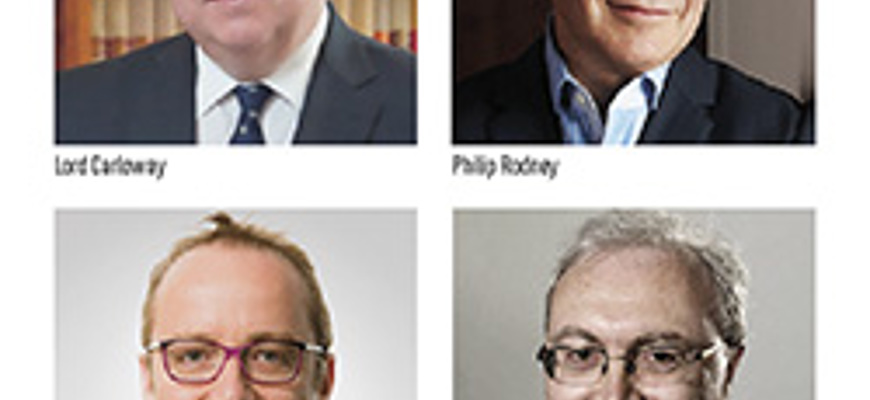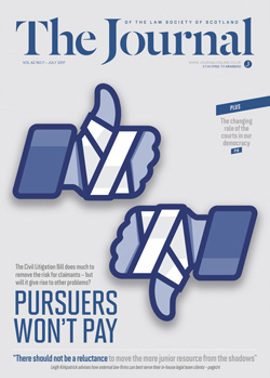Core values

What inspired you to become a lawyer? For some it might be the power of the law, when used properly, to change society for the better. Such fundamentals lie behind the theme of this year’s Law Society of Scotland annual conference, entitled “For the greater good”.
“For the greater good” is a theme adopted in the first keynote address, by the Lord President, Lord Carloway, on the Scottish courts in the 21st century. A keen proponent of reform, Lord Carloway wants to see the courts reflect the public’s changed expectations of what services should look like – swift and responsive, automated, readily available and accessible in a variety of different ways. His presentation takes place as the Scottish Civil Justice Council consults on its Rules Rewrite Project, and will allow opportunity for questions.
Where no lawyer has gone before
A more intriguing title has been chosen by Burness Paull chairman Philip Rodney for the second main address. “Don’t look back... solving the unsolvable and doing the undoable” is Rodney’s somewhat provocative way of saying that the good times enjoyed in the past won’t return; that new issues for clients are coming up all the time; and that our job as lawyers is “solving the problems that haven’t been encountered before: it’s about doing the undoable, about being pathfinders and looking for new opportunities”, he tells the Journal.
Subtitles in his talk borrowed from T Rex, Talking Heads and Neil Young suggest someone who recalls a certain era, but Rodney is relentlessly forward-looking. “When I was first in practice one would come across a variation of something you had seen before, but I genuinely think now that as the world changes, both in terms of the way it operates and the markets we operate in, there are things that we have never seen before, and that’s exciting.”
How can solicitors equip themselves for such challenges? Rodney has never forgotten his one-time mentor (and former Journal editor), the late Alfie Phillips, for whom he holds an undimmed admiration: “He could break everything back down to its fundamentals, understand the principles and work from them, and that’s what I think being a creative lawyer is about, working from first principles and being able to develop from there, so I think the best preparation is being well grounded in the fundamentals of law, but being prepared to look at the world anew and apply them.”
His talk has a very straightforward tie-in with the conference theme. “What do lawyers do? Lawyers solve problems, that’s what our job is at its fundamentals and I think we mustn’t forget that. Nothing more sophisticated!”
Nor do we have to look very far afield for business opportunities: “Since I qualified, people have been writing Scotland off, and they’ve been saying the same thing, that businesses get bigger and then move to London. But Scottish business has the ability to regenerate itself. You see new businesses being created, in sectors that we hadn’t anticipated. Skyscanner is a fantastic example. Ten years ago, who would have thought of it? It’s a danger, writing off Scotland and believing that all the good businesses migrate elsewhere.”
But there is an international dimension. “Ernst & Young reported that outside London, the region that had the greatest amount of inward investment was Scotland. And Scotland traditionally has engaged in a very meaningful way with global business and I think there are fantastic opportunities for lawyers to target that business that comes into Scotland. It’s increasingly part of our practice: about 40% of what we do now is international in some form or other. Over the last three years we have operated in more than 60 countries. So I think that part of being a Scottish lawyer is engaging with the global market.”
One final teasing reference in Rodney’s headings is to Road Runner and Wile E Coyote. But for who he casts in those roles, and how, you need to come and find out.
Ethics for in-house lawyers
Talk of commercial clients and their challenges takes us to an eye-catching session in the business and technology stream, when Professor Richard Moorhead of University College London will share his thoughts on “Mapping the moral compass – ethics for in-house lawyers”. Initially in practice as a solicitor, Moorhead has for the past 20-plus years taught and researched in the areas of legal services, legal ethics and access to justice.
His presentation will focus on his research of the same title. “It looks at the relationship between how in-house lawyers see their role and their ethical inclinations, how they balance different orientations – their business orientation and their ethical inclination.”
He expands on this: “I’ll talk about the kind of corporate scandals which have implicated in-house lawyers, a bit about different conceptions of roles, such as the idea that lawyers should be commercially oriented, or they should be independent, or they should be very client focused – how these might impact on their ethical decision-making.”
Moorhead tends to the view that ethical issues are not more acute for in-house lawyers, just different. “That’s because they are more versed in the organisation, if you like, and they might be more likely to be exposed to potential problems, but that also provides the opportunity to be more proactively good, so their role is broader and they have more opportunity to influence the business or the client for the good rather than simply taking things as they are, as private practice tends to have to do.” Both also face commercial pressures, again just in different forms.
You may also hear about his “Ethical leadership for in-house lawyers” project. “We’re engaging with the in-house lawyers themselves to think about how they manage for ethicality, how they manage their teams and structure their relations within their organisations to try and ensure as much as possible that legal work is conducted ethically, decisions are taken independently, and so on. The idea is that we will produce with in-housers ideas about best practice which they can adopt if they find them useful.”
Moorhead might even touch on research that suggests there may be a downside as well as an upside, to some outsiders’ perceptions at least, to in-house lawyers being given boardroom or other strategic roles, something close to the hearts of our In-house Lawyers’ Committee. But for when and how either view might prevail, come along and find out.
Returning to the main conference theme, how might in-house best relate to “For the greater good”? “There is obviously good in the sense that working for organisations that produce growth and jobs and so on is a positive,” Moorhead responds, “and we shouldn’t ever forget that, but also there is a growing interest in areas like business and human rights where in-house lawyers are sometimes taking a lead in trying to implement the Ruggie criteria [the UN Guiding Principles on Business and Human Rights], so there are those kinds of opportunities.”
All this and more...
If we mention that the programme also features a session with the Lord Advocate, panel discussions including the challenges of the EU negotiations, and a keynote “In conversation” with Dame Katherine Grainger, law graduate and multiple Olympic medallist, to name only three further attractions, there ought to be enough there to tempt readers to take a further look at the programme, on the Society’s website.
When and where
The conference takes place on Tuesday 19 September, from 9.15am to 5.30pm at the Edinburgh International Conference Centre. Earlybird 20% discount applies until 21 July; quote code FTGG15 for 15% discount from 22-31 July.
In this issue
- Family law: still scope for reform
- People's court
- The importance of lawyers in a democratic society
- Thy will be done
- Children's rights and physical punishment
- Pension sharing and professional negligence
- Reading for pleasure
- Opinion: Bruce Adamson
- Book reviews
- Profile
- President's column
- People on the move
- 400 years – still innovating
- Litigation: a bill to settle
- Access to justice: the small print
- Benefits of devolution
- The changing role of the courts in our democracy
- Core values
- The will bank opportunity
- Deep and meaningful
- The fall and rise of interrogatories
- To act or not to act?
- Immigration issues: more red tape
- Taxman scores winner in Rangers contest
- EIA: the regimes change
- Scottish Solicitors' Discipline Tribunal
- Practitioners or salesmen?
- Where the buck stops
- Law reform roundup
- Cyber basics for lawyers
- Practice points from missives review
- Money laundering update: new regulations in force
- Courts raise the stakes
- May: the force be not with you
- Conference success
- SYLA: 2016-17 in focus
- Ask Ash






